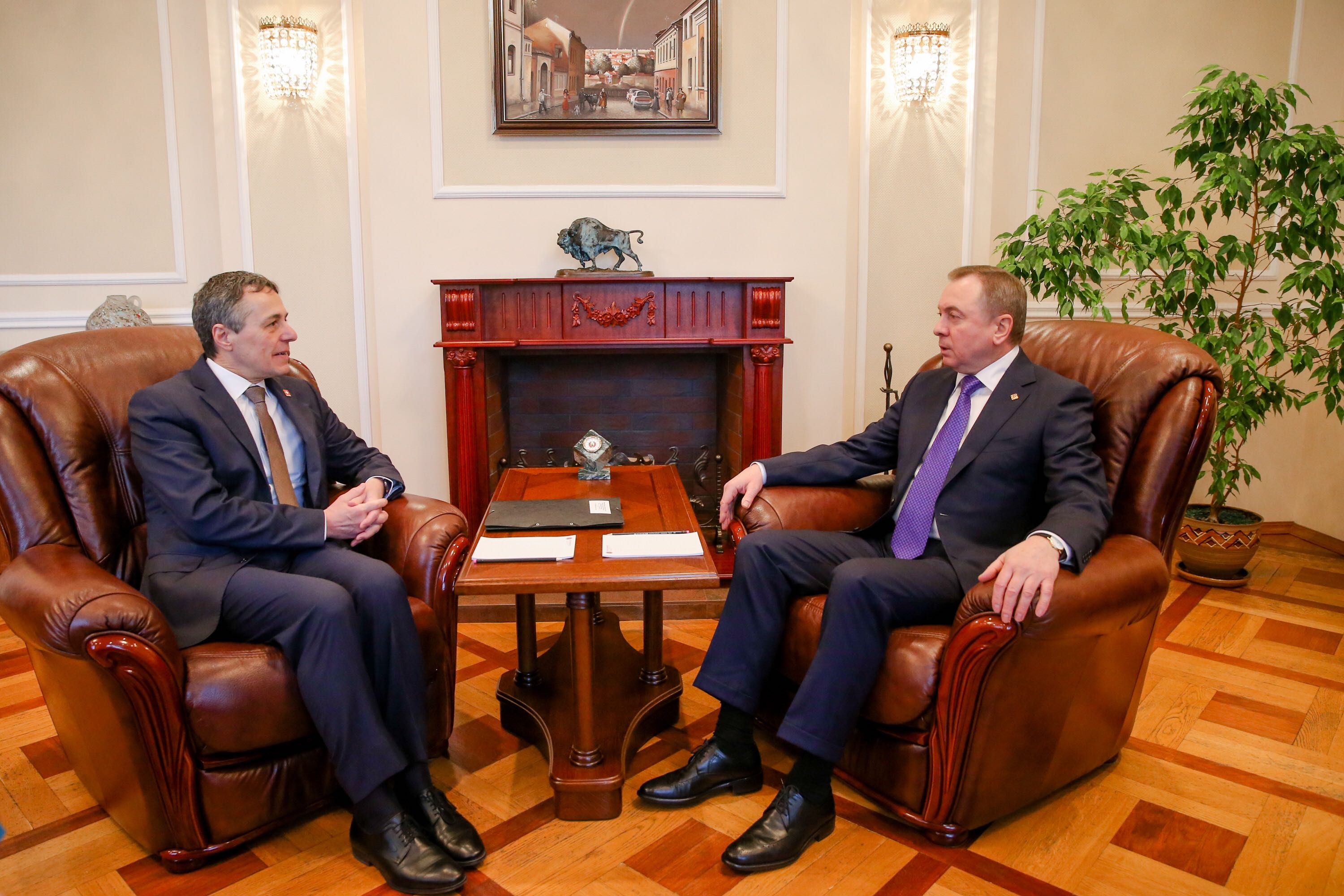«It is the first time that a federal councillor has visited Belarus”
Claude Altermatt, the Swiss Ambassador in Minsk, talks about bilateral relations between Switzerland and Belarus and the importance of the opening of the Embassy.

Federal Councillor Ignazio Cassis talks to the Belarusian Foreign Minister Uladzimir Makej in Minsk. © MFA Belarus
A good basis for further cooperation
Mr Altermatt, you are the Swiss ambassador to Minsk. The painter Marc Chagall is surely one of the most famous Belarusians for Swiss people. Can you name some other famous bridge builders between Switzerland and Belarus?
For centuries different peoples co-existed on the territory of today's Belarus. It was a border country, a country of transit between Poland and Russia, the Baltic States and the Black Sea. For a long time, there was no such thing as a 'Belarusian', so I think we should be careful not to label people in terms of nationality. The great freedom fighter Kosciusko was considered a Polish (and American) hero, although he was born on the territory of today's Republic of Belarus and died in 1817 in exile in Solothurn against the backdrop of the European Restoration. And the great artist Marc Chagall had a Jewish upbringing in Vitebsk, which was then part of the Russian Empire, and lived in Berlin and France.
In 2017 you took over the Minsk office, which has now been upgraded to an embassy. What were your first impressions of the country?
Since I presented my credentials as the first Swiss ambassador with a permanent residence in Belarus to President Lukashenka on 12 September 2019, I have felt a lot of goodwill from the Belarusians, in diplomatic circles, and also from the few Swiss people familiar with this country.
Last autumn a newspaper asked the foreign minister, Vladimir Makei, if he were granted one wish, what would it be. He said it would be to make Belarus the Switzerland of Eastern Europe.
I have been impressed by the perseverance of the people I have met in this country. Perhaps it also comes from the historical turmoil experienced by the people of Belarus, which for the last 250 years has undergone repeated crises, wars and disasters.
What is the state of Swiss-Belarusian relations?
They improved a great deal just prior to the opening of the embassy and also since, not least thanks to the activities of Swiss and Belarusian parliamentarians. There is also renewed contact in other areas, such as between universities and businesses. In 2014, a Swiss company opened a new facility for the manufacture of trams and trains, which has since created about 1,550 new jobs. The state-of-the-art trains are now a frequent sight on lines throughout the country and have come to symbolise Swiss reliability and quality.
How do you expect Switzerland's relations with Belarus to change with the opening of the embassy in Minsk?
Federal Councillor Cassis's visit for the official opening will be a symbolic boost for our bilateral relations. It will be the first time that a federal councillor has visited Belarus, which until recently Swiss people knew very little about. Visits like this are very important, since they are taken very seriously here. The opening of the embassy is also certainly a good basis on which to pursue our cooperation in various areas, such as human rights.
How will the new embassy change your day-to-day work?
I've always been the lone warrior here, responsible for just about everything. My everyday duties – autonomous management of the representation, reporting on political matters, public relations and representation duties – are unlikely to change much. For the past two years, I have managed the office with a view to it being upgraded to an embassy. The people here greatly appreciated that. Switzerland engages in political dialogue with Belarus on a number of levels, for example on human rights and the rule of law. Has any progress been made on that front?
The political dialogue and the intensive exchange this involved between the deputy state secretary and deputy foreign minister has been productive, despite all the differences that exist between Switzerland and Belarus in terms of state structure and political culture. Some progress has also been made on human rights, including bringing an end to torture. We will continue these talks!
Where is there potential to develop relations between Switzerland and Belarus?
The potential certainly exists, but is hardly being exploited at the moment. It's in the interests of both of our countries to develop our relations. There have already been encouraging developments. This January saw the founding of a Switzerland-Belarus friendship association. The commitment and activities of volunteers and interested parties in Switzerland will be very important. And in terms of business relations – trade, investments – the Belarusian-Swiss Business Council is doing very good work.
